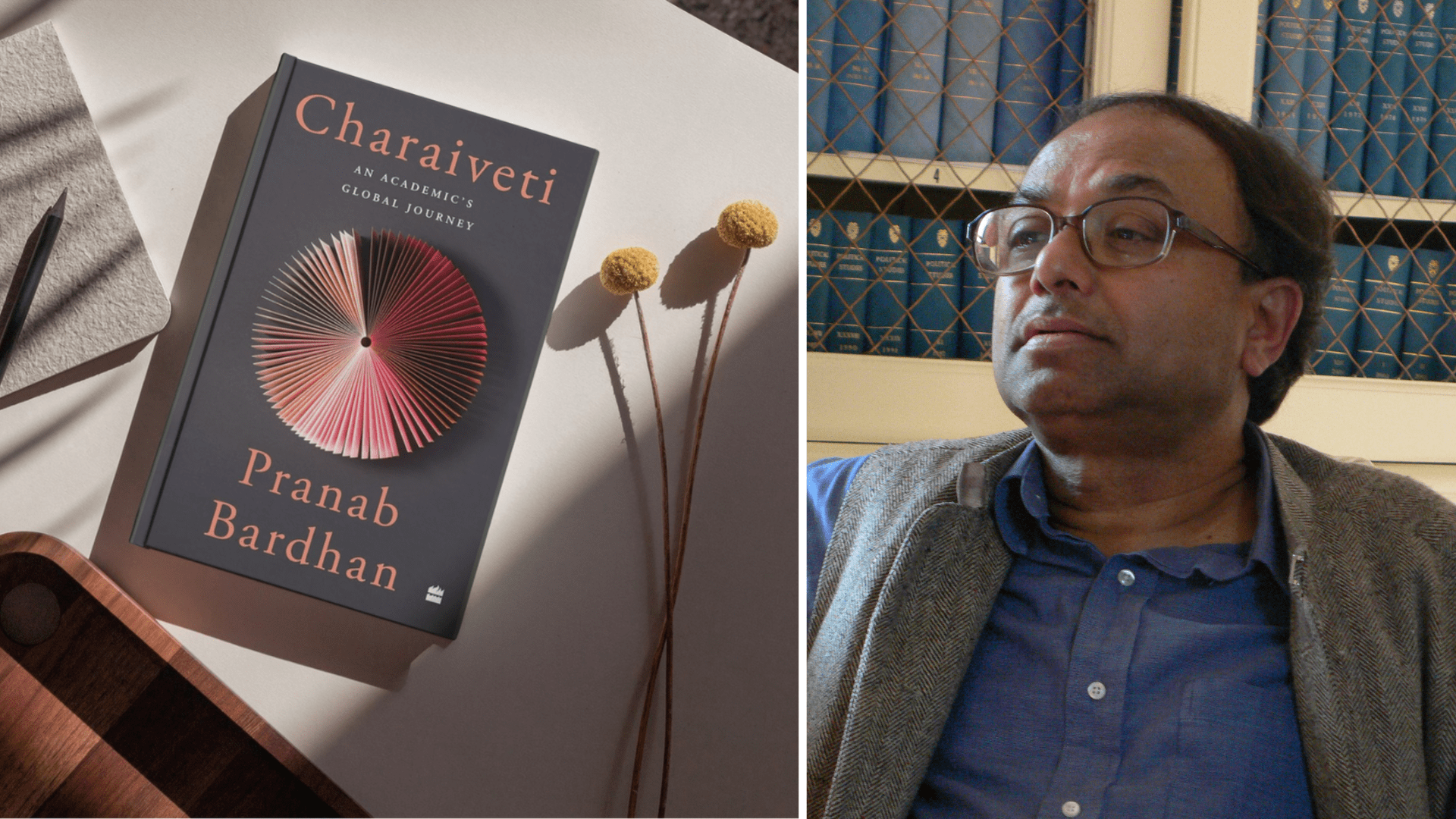Pranab Bardhan, Distinguished Professor Emeritus of Economics at the University of California, Berkeley, is a leading Indian economist and author of a new memoir, Charaiveti: An Academic’s Global Journey. The word Charaiveti, from an ancient Sanskrit hymn, means ‘keep moving’, in search of self-realization – and in his book, Pranab weaves together his observations and anecdotes about the economy, politics, and culture, his life travels, his professional endeavors, and more.
He will share his book with the Mittal Institute community at an October 3 talk, where he will be joined in discussion by Abhijit Banerjee, Ford Foundation International Professor of Economics at the Massachusetts Institute of Technology and Nobel Prize laureate. Pranab gave us a glimpse into his book and some themes he will share at the talk.

Charaiveti: An Academic’s Global Journey (left) written by Pranab Bardhan (right).
Mittal Institute: Thank you, Pranab, for giving us a preview of your talk and some insight into your memoir. You grew up in a family with modest means in Kolkata. Can you share how your upbringing impacted your future career choices?
Pranab Bardhan: Growing up in a poor neighborhood and interacting with the street children I used to play with, and thereby observing their families’ struggle with poverty, led to an understanding of the nature of social and economic inequality and the institutional and structural conditions that underlie the persistence of these problems. This theme has been an abiding preoccupation in my studies and research throughout my professional life.
Mittal Institute: What drew you to the field of Economics, and how have you seen the field grow or change in India over these last decades? What aspect of your professional career are you most proud of?
Pranab Bardhan: In my high school and early college days, I was particularly interested in history, but very soon I realized that economic forces often shape the broad pattern of history, and in trying to understand those forces, I slowly gravitated toward Economics. When I was a graduate student in Cambridge, England, and then a young faculty member in Cambridge, Massachusetts, I primarily worked and published on theoretical-mathematical models. But soon my research interests shifted to empirical work with ground-level granular data on the lives of the poor. I went back to India and immersed myself in data collection and analysis. Then, somewhat dissatisfied with the nature of available secondary data, I started organizing my own surveys in large samples of villages in West Bengal, particularly concerned with the institutional and structural relations mentioned above. At that time, it was a somewhat uncharted territory even in development economics, a field that was in any case rather marginalized in the discipline of Economics. I think there has been a big change in all this in the last few decades. It was quite a struggle for us early researchers in this area to get recognition for our work and even to publish papers in journals. It is gratifying to note that our early efforts contributed to the changes in the discipline of Economics, not just in making empirical work in micro-development more visible but also in paving the way for micro-institutional economics, an emerging new field in Economics. Another area where we ventured was in doing interdisciplinary work, particularly involving social anthropology and political economy.
Mittal Institute: Can you share some of the main themes the book touches upon in terms of economic analysis?
Pranab Bardhan: The book touches on many issues of political economy and comparative economic systems (including big systemic questions of capitalism, socialism, democracy, nationalism, the advances and pitfalls of economic reform, some features of the Chinese system, and so on). But it also has many anecdotes about the large number of remarkable economists and other social scientists I have had the good fortune to interact with in my long peripatetic academic career.
The book touches on many issues of political economy and comparative economic systems … But it also has many anecdotes about the large number of remarkable economists and other social scientists I have had the good fortune to interact with in my long peripatetic academic career.
Mittal Institute: Your book also explores subjects like politics, culture, history, literature, cinema, and more. How did you weave these concepts together, and why was it important that you include such a variety of topics?
Pranab, Bardhan: Economists today are often much too narrowly specialized. But as someone always actively interested in those other socio-cultural-historical issues, I found such weaving relatively effortless. I believe these issues enrich even our primarily economic endeavors.
Mittal Institute: What was the most challenging part of writing the book?
Pranab Bardhan: Since I wrote this book with the general reader in mind (not just my fellow economists), it was challenging to write on what I believe to be rather large economic systemic questions and keep the interest of non-economist readers alive—that’s where the large numbers of human-interest stories and anecdotes in the book played an important role.
Mittal Institute: What are you most proud of with your memoir, and what is one thing you want our readers to know about it?
Pranab Bardhan: Several readers (many of them non-economists) have told me that once they started reading the book, they found it ‘difficult to put down.’ This readability is what I’d consider no small achievement for an academic steeped in what used to be called a ‘dismal science.’ Also, the global nature of the book’s range of discussion with observations on society, polity, economy, and culture of several countries (not just India or the U.S.) has interested a wide range of readers.
☆ The views represented herein are those of the interview subject and do not necessarily reflect the views of the Mittal Institute, its staff, or its steering committee.
